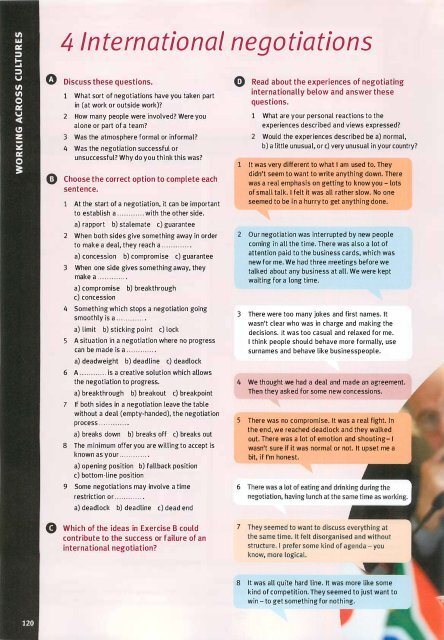Market_Leader_2011_Upper_SB_www.frenglish.ru
You also want an ePaper? Increase the reach of your titles
YUMPU automatically turns print PDFs into web optimized ePapers that Google loves.
4 International negotiations<br />
0 Discuss these questions.<br />
1 What sort of negotiations have you taken part<br />
in (at work or outside work)?<br />
2 How many people were involved? Were you<br />
alone or part of a team?<br />
3 Was the atmosphere formal or informal?<br />
4 Was the negotiation successful or<br />
unsuccessful? Why do you think this was?<br />
() Choose the correct option to complete each<br />
sentence.<br />
1 At the start of a negotiation, it can be important<br />
to establish a ............ with the other side.<br />
a) rapport b) stalemate c) guarantee<br />
2 When both sides give something away in order<br />
to make a deal, they reach a ............ .<br />
a) concession b) compromise c) guarantee<br />
3 When one side gives something away, they<br />
make a ............ .<br />
a) compromise b) breakthrough<br />
c) concession<br />
4 Something which stops a negotiation going<br />
smoothly is a ............ .<br />
a) limit b) sticking point c) lock<br />
5 A situation in a negotiation where no progress<br />
can be made is a ............ .<br />
a) deadweight b) deadline c) deadlock<br />
6 A ............ is a creative solution which allows<br />
the negotiation to progress.<br />
a) breakthrough b) breakout c) breakpoint<br />
7 If both sides in a negotiation leave the table<br />
without a deal (empty-handed), the negotiation<br />
process ............ .<br />
a) breaks down b) breaks off c) breaks out<br />
8 The minimum offer you are willing to accept is<br />
known as your ............ .<br />
a) opening position b) fallback position<br />
c) bottom-line position<br />
9 Some negotiations may involve a time<br />
restriction or ............ .<br />
a) deadlock b) deadline c) dead end<br />
Q Read about the experiences of negotiating<br />
internationally below and answer these<br />
questions.<br />
1 What are your personal reactions to the<br />
experiences described and views expressed?<br />
2 Would the experiences described be a) normal,<br />
b) a little unusual, or c) very unusual in your country?<br />
1 It was very different to what I am used to. They<br />
didn't seem to want to write anything down. There<br />
was a real emphasis on getting to know you - lots<br />
of small talk. l felt it was all rather slow. No one<br />
seemed to be in a hurry to get anything done.<br />
2 Our negotiation was inter<strong>ru</strong>pted by new people<br />
coming in all the time. There was also a lot of<br />
attention paid to the business cards, which was<br />
new for me. We had three meetings before we<br />
talked about any business at all. We were kept<br />
waiting for a long time.<br />
3 There were too many jokes and first names. It<br />
wasn't clear who was in charge and making the<br />
decisions. It was too casual and relaxed for me.<br />
l think people should behave more formally, use<br />
surnames and behave like businesspeople.<br />
4 We thought we had a deal and made an agreement.<br />
Then they asked for some new concessions.<br />
5 There was no compromise. It was a real fight. In<br />
the end, we reached deadlock and they walked<br />
out. There was a lot of emotion and shouting- I<br />
wasn't sure if it was normal or not. It upset me a<br />
bit, if I'm honest.<br />
6<br />
8 Which of the ideas in Exercise B could 7<br />
contribute to the success or failure of an<br />
international negotiation?<br />
8 It was all quite hard line. It was more like some<br />
kind of competition. They seemed to just want to<br />
win - to get something for nothing.


